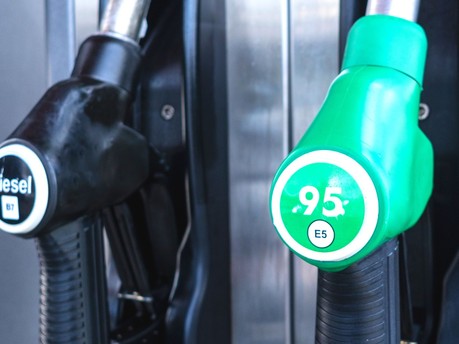What is the difference between petrol and diesel?
Understanding which fuel is best for you
With petrol increasing in price — even matching the price of diesel and surpassing it on occasions — you may be exploring other ways to power your vehicle in a bid to save money.
Looking at the options on the table, diesel is one that has been around for more than a century, and is often touted as being more efficient than petrol. But is this really the case? In this article, we’ll explore all things petrol and diesel by answering some of the most common questions you may have about the different fuels.
What is petrol?
Petrol is a liquid fuel derived from crude oil (a mixture of hydrocarbons formed from the remains of ancient plants and animals). It's the most common fuel used to power cars in the UK, and at the pump, it's labelled as E5 or E10 indicating the percentage of ethanol blended with the fuel.
What is diesel?
Diesel, similar to petrol, is liquid fuel derived from crude oil. Invented by German engineer Rudolf Diesel in the late 19th century, it’s chemical composition differs to petrol providing it with a much higher energy density. At the pump, you may find it labelled as B7 indicating that the fuel contains up to 7% biodiesel.
How do petrol engines work?
Petrol engines work using the principle of spark ignition. In a petrol engine, fuel and air are mixed together and compressed by a piston. A spark plug then ignites the mixture, causing an explosion that drives the piston down and generates power.
How do diesel engines work?
On the other hand, diesel engines work using the principle of compression ignition. This means the air inside the engine’s cylinders is highly compressed until it becomes hot enough to ignite the diesel fuel. Again, this causes an explosion that drives the piston down and powers the engine.
Petrol vs. diesel: What’s the difference?
Aside from differences in the way their engines operate and their chemical composition, there are other key differences between petrol and diesel. Understanding these differences will also help you to identify which vehicle is right for you.
The pros of petrol:
- Less harmful emissions: Petrol engines produce lower levels of harmful emissions than diesel engines, such as nitrogen oxides (NOx) and particulate matter (PM). These emissions contribute to air pollution and smog in urban areas and can cause health issues, including respiratory problems, asthma, and cancer, amongst others.
- Initial cost: Petrol vehicles are often more more affordable than their diesel counterparts.
- Fuel availability: In some regions, diesel fuel may be less readily available than petrol which can be a great inconvenience.
- Cold weather performance: Petrol engines tend to perform better in extremely cold weather conditions compared to diesel engines, which can have difficulty starting.
- Maintenance costs: Diesel engines can be more complex and require specialised maintenance compared to petrol engines. This can lead to higher maintenance and repair costs over time.
The pros of diesel:
- Energy density: Diesel fuel contains more energy per gallon compared to petrol, which means you can drive longer distances on a full tank.
- Fuel efficiency: Diesel engines are typically more fuel-efficient than petrol engines, resulting in better mileage and reducing overall fuel costs.
- Torque: Diesel engines generate higher torque at lower RPMs, providing excellent pulling power for tasks like towing.
- CO2 emissions: As diesel engines are much more fuel-efficient than petrol engines, they typically emit less CO2 per mile driven.
- Longevity: Diesel engines are known to be more durable and last longer than petrol engines. Some diesel vehicles can even exceed 300,000 miles with proper maintenance.
Is diesel worse for the environment than petrol?
The answer to this question depends on how you measure the environmental impact of fuel. Diesel has lower CO2 emissions than petrol, which means that it has a lower impact on climate change. However, diesel has higher nitrogen oxides (NOx) and particulate matter (PM) emissions than petrol, which means that it has a higher impact on air quality and human health. Therefore, there is no clear-cut answer to which fuel is better for the environment.
Despite this, it’s worth noting that modern diesel engines have made significant strides in reducing these harmful emissions and diesel vehicles that comply with Euro 6 emission standards are now almost comparable to petrol cars in terms of NOx emissions.
Is diesel more expensive than petrol?
The price of petrol and diesel fuel can vary depending on location and market conditions — as we all know by now. Historically, however, diesel has often been slightly more expensive than petrol due to its higher energy density and production costs. Although, diesel’s greater fuel efficiency often balances out the cost difference, providing better mileage.
What is the future of petrol and diesel?
As we look ahead, one thing is clear about the future of petrol and diesel: their usage will decline in the coming decades. Concerns about the CO2 emissions from both fuels have persisted due to their significant contribution to climate change. In turn, the UK government, alongside many other countries worldwide, has outlined plans to ban the sale of new petrol and diesel cars by 2035.
Hire your next petrol or diesel vehicle at Rent Direct
At Rent Direct, we have a wide selection of vehicles in stock for you to choose from, including both petrol and diesel vehicles - and hybrid models too. You can view our range of cars, MPVs and vans available to hire by using our online booking tool or you can contact us for more information.

